[ad_1]
Approximately 500 million tweets are published every day — and not all are from human users. In fact, if you’ve ever retweeted an article on Twitter, also known as X, the chances are high that the tweet was created by a bot instead of a human user.

A study by Pew Research estimates that two-thirds of all tweeted links are shared by suspected bots. As bots continue to be more prolific on this popular social media platform, it’s important to understand what a Twitter bot is exactly.
You might even need to know how to make one. Since a bot can automate part or all of your Twitter activity, it can accelerate your Twitter marketing strategy while saving you time.
Let’s take a closer look at what a Twitter bot is and what benefits it offers below.
What is a Twitter bot?
A Twitter bot is an account that’s programmed to perform actions, like send tweets at a scheduled time or follow accounts. These bots are created and managed via the Twitter API.
By automating certain tasks, Twitter bots can help you establish an active presence on one of the most widely used social media platforms in less time. With a bot, you can schedule tweets to publish at times when you’re not online. You can automate responses to new followers. You can retweet content with a particular keyword or hashtag. You can follow or unfollow accounts — and much more.
If you’re not sure how to share content, engage visitors, and market your business on Twitter, check out the Twitter Training Course on HubSpot Academy.
Are Twitter Bots legal?
Yes, Twitter (or X) bots are legal — so long as they’re used according to X’s automation development rules.
The short of it is that you must not be spammy, and that you must always give users a way to opt out of receiving your automated posts.
In general, your Twitter bot should not spam or harass other users, or engage in any other activity that violates X’s terms of service. If possible, you should disclose that the account is a bot in the bio and attribute it to yourself or your organization.
As long as you adhere to Twitter’s rules and guidelines, your bot will be a valuable addition to your profile. For instance, you can use them for posting polls, controlling tweet reply settings, and engaging with super followers. Twitter has even introduced bot labels to help users identify automated accounts.
Now, let’s walk through each step of creating a Twitter bot below.
How to Make a Twitter Bot
- Apply for a Twitter developer account.
- Create a Twitter project and app.
- Edit the Twitter application’s settings.
- Generate your access token and secret access token.
- Program your Twitter bot.
- Test your Twitter bot.
1. Apply for a Twitter developer account.
To start, go to developer.twitter.com and log in with an existing account or sign up for one. (Whether you’re using an existing or new account, make sure to clearly state that it’s a bot in the bio and who built it.)
You won’t be able to create an app right away. Instead, you’ll have to apply for a developer account with Essential access first. The application process is easy. You’ll just need to provide some basic account information and explain your intended use of the Twitter API.
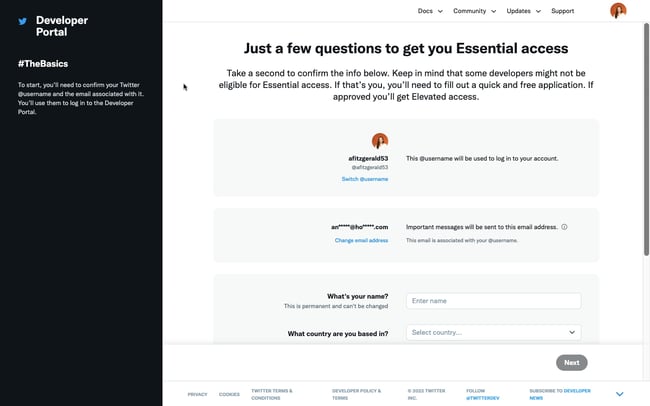
2. Create a Twitter project and app.
Once you’ve confirmed your email, you’ll be redirected to your developer portal. Click the +Create Project button in your dashboard.
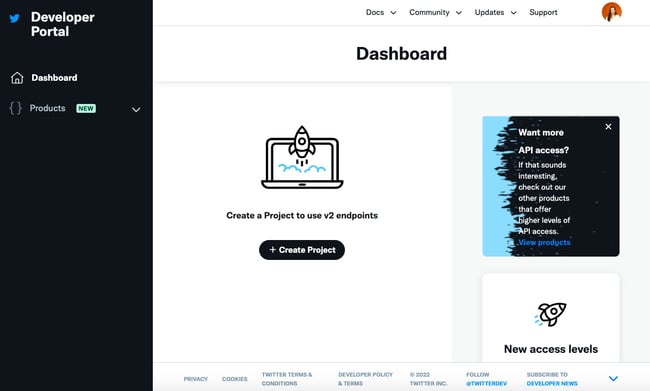
You’ll need to provide a project name, use case, brief description, and app name.
Then you’ll be given an API key, an API secret key, and Bearer token. Store these in a safe place — you’ll need them later.
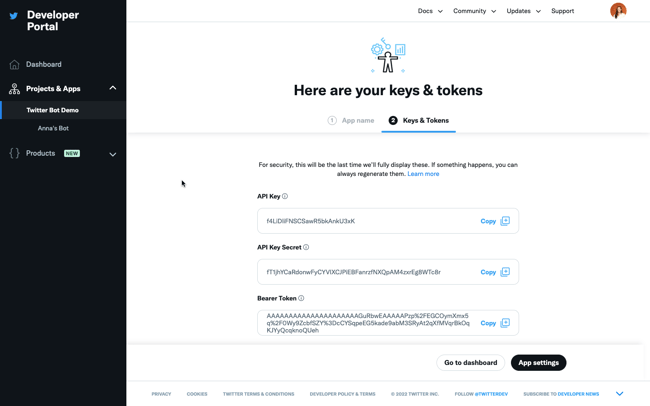
3. Edit the Twitter application’s settings.
Now click the App Settings button in the bottom right corner. Scroll down to the heading labelled “User authentication settings.” Click Set Up.
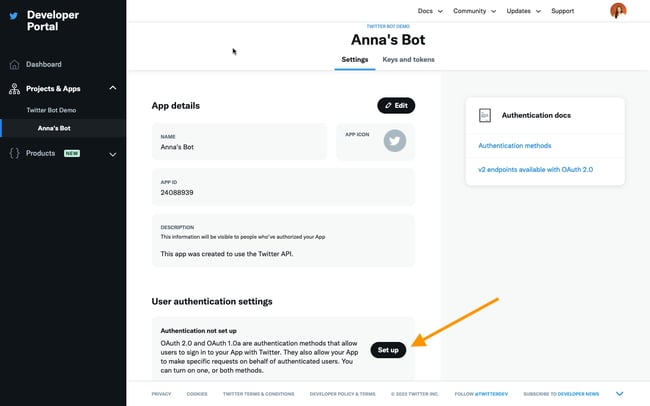
Toggle on OAuth 2.0 and 1.0a, then scroll down to edit the App Permissions and select the Read and write and Direct Message option.
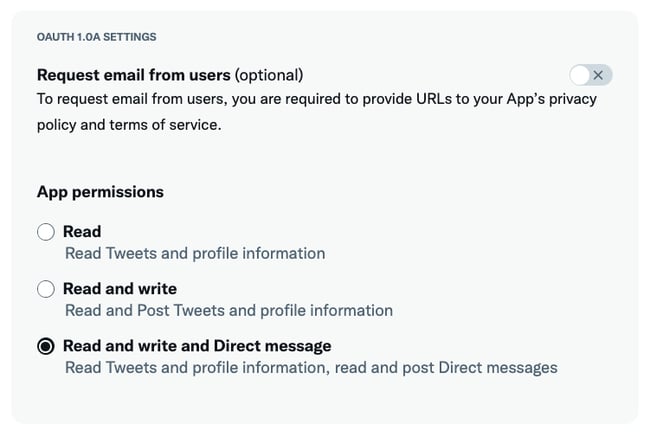
Finally, add a callback URI and website URL and click Save at the bottom of the page.
4. Generate your access token and secret access token.
Once you save the app permissions, you’ll be redirected to your project dashboard. Switch from Settings to the Keys and Tokens tab. Next to Access Token and Secret, click Generate. You’ll need these in the next steps.
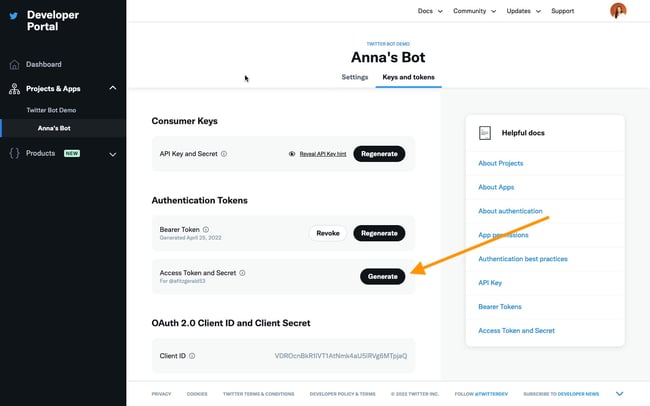
5. Program your Twitter bot.
You’re ready to program your bot now! To start, open the Twitter Bots app and sign in with your Google account that’s associated with your Twitter account. Fill in the input fields with the appropriate keys and tokens you got in earlier steps. Then specify the search criteria. Your app will find all new tweets that match this search phrase. I’ll choose #hubspot for my app.
Finally, you can select the action you want your bot to take from the drop-down menu. Possible actions include sending a public reply or private message, retweeting the tweet, following the account that tweeted it, and more. If you choose one of the options that require predesignated text, then you can fill out the “text” field to the right of the drop-down menu.
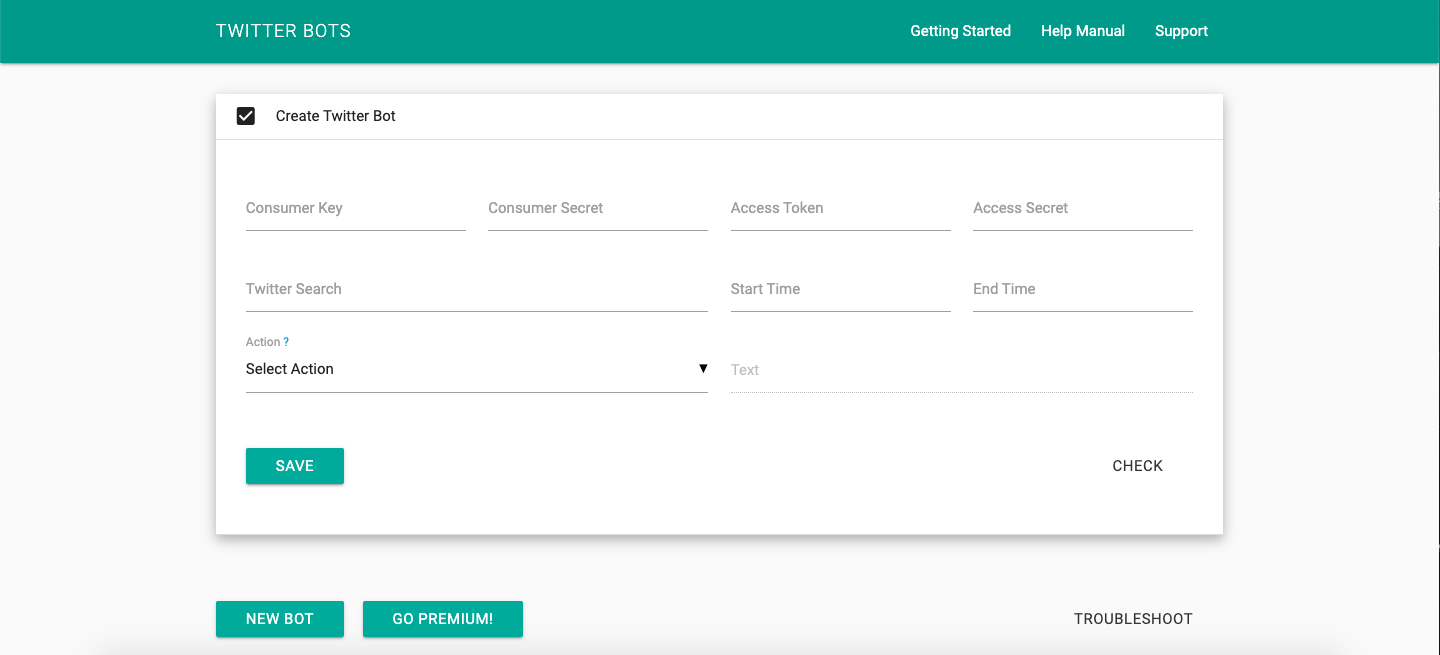
Once you click save, your bot is initiated and will auto-run in the background.
6. Test your Twitter bot.
There’s nothing to test after you’ve created your bot, because it will run on its own. Still, you’ll want to take several steps to ensure that your Twitter bot is giving you the results you want.
- If possible, use the bot on a small audience. Begin by testing your bot with a small group of trusted followers or friends. This will allow you to collect feedback and make any necessary adjustments before reaching a wider audience.
- Monitor bot responses. Pay really close attention to how your bot responds to different commands or interactions, especially retweets and replies. Pause your bot if something goes awry.
- Test different scenarios. Try out various scenarios and commands to see how your bot handles them. For example, test how it responds to different keywords or hashtags, how it handles retweets or follows, and how it interacts with other users.
- Check for errors or bugs. Keep an eye out for any errors or bugs that may occur during runs. This could include issues with API authentication, incorrect responses, or technical glitches. Pause your bot if you need to adjust the settings.
By thoroughly testing your Twitter bot, you can ensure that it’s functioning smoothly and accurately representing your brand without seeming too “bot-like” (although sometimes it’s okay to use a bot and be transparent about it). This will help you build trust and engagement with your followers.
Now that you know how to create one, let’s take a closer look at a few specific use cases of Twitter bots below.
How can you use Twitter bots?
There are several ways you can use Twitter bots: to tweet, delete tweets, quote tweets, and more. In this section, we’ll focus on the use cases that were made possible by the release of Twitter API v2.
1. Post polls.
Thanks to the new release of the Twitter API, you can now use a bot to post Twitter polls. Twitter polls can be a great tool for generating awareness about an upcoming product or campaign launch, getting customer feedback, or starting a conversation with your audience.
HubSpot, for example, recently posted a poll asking what’s the biggest pain point among B2B buyers. They then linked to a guest post that featured Michael Vittum, HubSpot Senior Manager & GTM Lead for Payments, that detailed how B2B buyers don’t just have one point, but several. This is an excellent way to use Twitter polls to engage your audience and drive traffic to another site.
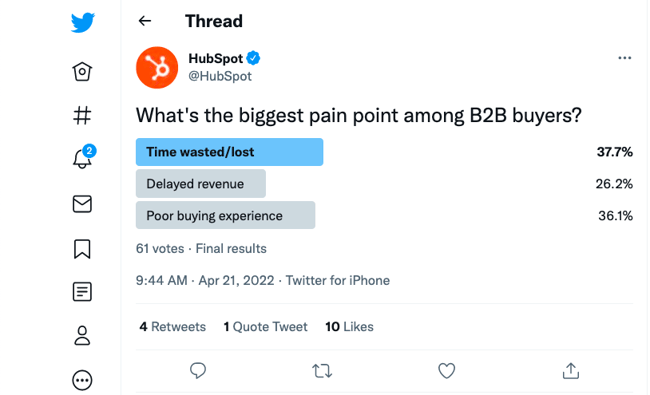
2. Set tweet reply settings.
You can also use a Twitter bot to control who can reply to your tweets after you’ve posted them. Before the release of the new Twitter API, you could limit who replied to your tweets but only when writing the tweet. You couldn’t change those settings later.
This can help businesses reduce spam or unwanted replies and foster a meaningful conversation among a specific number of people. You can configure your bot so that only followers can reply to your tweets or only people mentioned in the tweet.
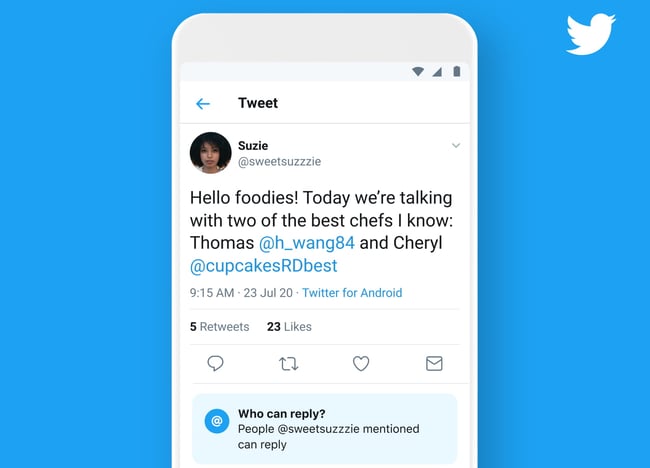
3. Tweet to Super Followers.
Super Followers are paid monthly subscribers that sign up for exclusive content from creators on Twitter. Creators can now tweet bonus content, exclusive previews, and perks to this specific group of followers using a Twitter bot to keep them engaged and delighted.
For example, MakeupforWOC offers exclusive Q&As, advice, and other content to her Super Followers.
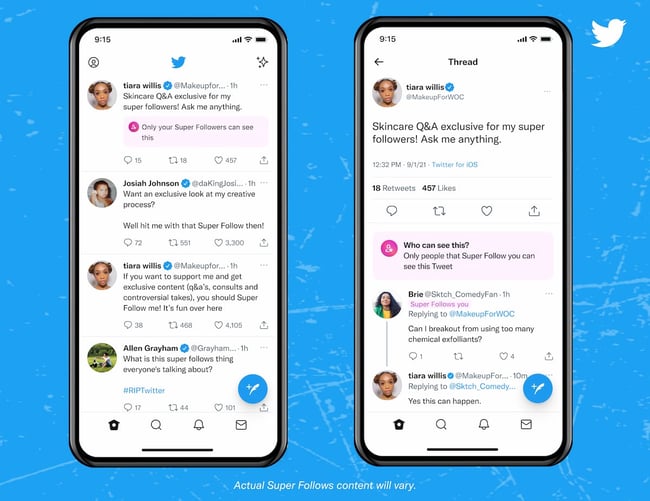
4. Send automated DMs.
You can also send automated direct messages (DMs) using a Twitter bot, but be mindful that X has more stringent rules regarding this practice.
For one, users must have indicated they want to receive DMs from you (whether by following you or interacting with you), and you must provide a way for users to opt out.
Automated DMs, like marketing emails, will allow you to engage with your audience on a more personal level.
With a Twitter bot, you can set up predefined messages that are sent to users who interact with your account or meet certain criteria. For example, you can use a bot to send a welcome message to new followers.
However, it’s essential to avoid spamming recipients with excessive or irrelevant messages. Make sure to tailor your automated DMs to provide value and enhance the user experience.
5. Reply to Tweets.
The simplest way to use Twitter bots? To reply to Tweets. This can be a powerful way to provide timely responses to users on the platform. For example, if someone reaches out to your support team via Twitter, you can automatically reply based on the words they used in their Tweet.
(As a reminder: With a Twitter bot, you can set up predefined replies that are triggered based on certain criteria, such as specific keywords or hashtags. Pretty handy!)
As always, use caution when using Twitter bots to reply to tweets. It’s crucial to ensure that your bot’s responses are relevant, valuable, and respectful, or X may flag your account or ban you altogether.
If you want to leverage these and other benefits, you can create a Twitter bot. Creating one is relatively easy, as we covered above. You don’t need to code anything or even know how to code. You just need to understand the basics of an application programming interface (API), like that you’ll need an API key and some tokens to authenticate your request.
Best Twitter Bots
- Alt Text Reminder
- Pikaso
- The MET
- Colorize_Bot
- Wayback_exe
While bots can be used for spam and other nefarious activity, many bots are simply used for automation. To help users decide which bots to trust, Twitter has begun rolling out bot labels. These clearly mark that the account is automated and isn’t suspected of doing any harm.
These labels are not endorsements, but many individuals do endorse bots and the automation they enable. In an article for the Twitter blog, artist and bot developer Andrei Taraschuk said, “Bots are actually better in so many use cases than humans. They never forget, they never tire of sharing. They remember exactly what they shared and what they didn’t.”
Keeping these benefits as well as the use cases discussed above in mind, let’s take a look at some of the best bots on Twitter.
1. Alt Text Reminder
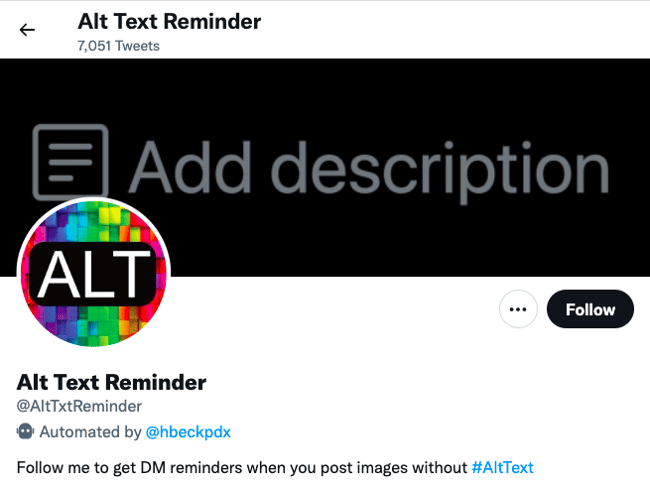
Alt Text Reminder is a Twitter bot designed to improve website accessibility. It sends direct messages to its followers to add alt text when they Tweet an image without it. Alt text is a description of an image that can be read by a screen reader and is therefore important for the visually-impaired or other people using a screen reader. It’s also useful for people with low bandwidth connections or other issues that cause images not to load on their screens.
2. Pikaso
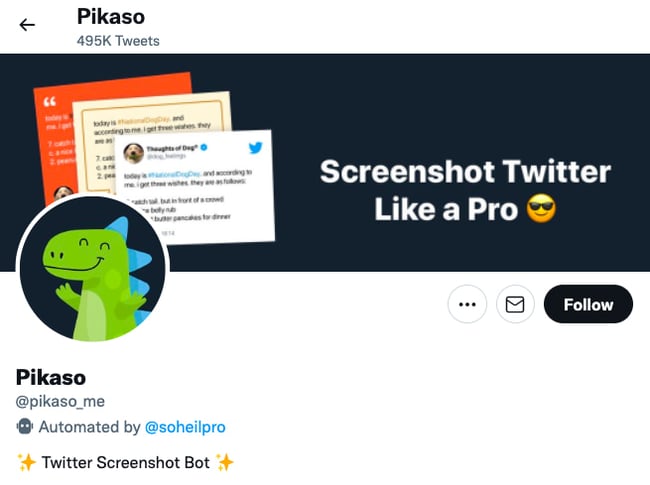
As a Twitter screenshot bot, Pikaso is an ideal Twitter bot to follow if you frequently take screenshots of Tweets to post them on other social media platforms, blog posts,or other marketing collateral. You can’t use it to screenshot Tweets with images or videos, but everything else is fair game.
3. The MET
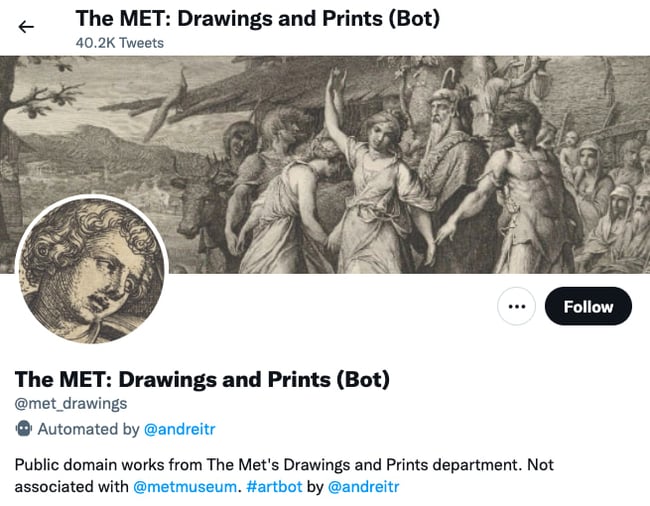
Designed to help the Metropolitan Museum of Art showcase work from its Drawings and Prints department, this bot Tweets out multiple works a day. The MET is just one of many “art bots” on Twitter. Along with bots for museums like the the Art Institute of Chicago and the Guggenheim, this type of bot Tweet nearly 250,000 works in a given month and receive millions of likes and comments.The bot developer, Taraschuk, says these bots are designed to bring culture to Twitter.
4. Colorize_Bot
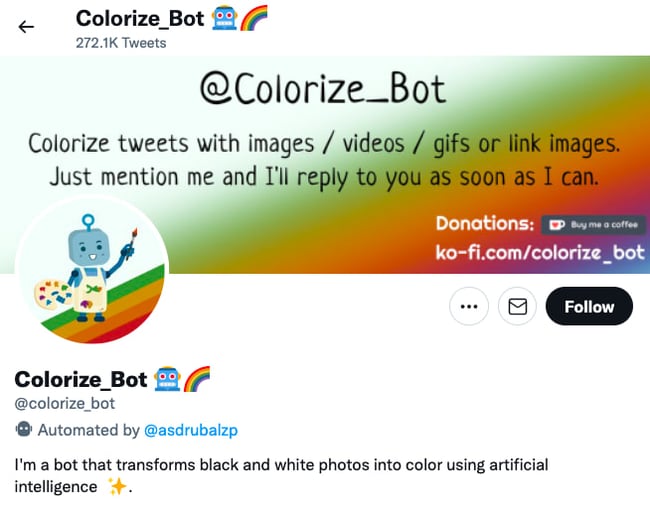
Colorize_Bot is an automated account that uses AI to transform black-and-white images into ones with color. So if you have or find an image that’s perfect for a blog post, landing page, or another piece of content but you’d prefer it in color, then you can use this bot.
5. Wayback_exe

Wayback_exe is a Twitter bot that uses data from the Wayback Machine to post screenshots of early web pages, primarily from the 90s, in old browsers. It’s a great bot to follow if you work or write about web design, or are simply interested in how web design has evolved through the years.
Automating Tasks with a Twitter Bot
A Twitter bot can help automate administrative or non-essential tasks, like sending a DM to new followers or following an account based on a hashtag they use. This can help you advance your Twitter marketing without investing much time and effort.
Editor’s note: This post was originally published in December 2020 and has been updated for comprehensiveness.
[ad_2]
Source link
![How to Make a Twitter Bot: A 6-Step Guide Download Now: How to Use Twitter for Business [Free Kit]](https://no-cache.hubspot.com/cta/default/53/190da11f-58c6-41d5-a397-843618741e09.png)

